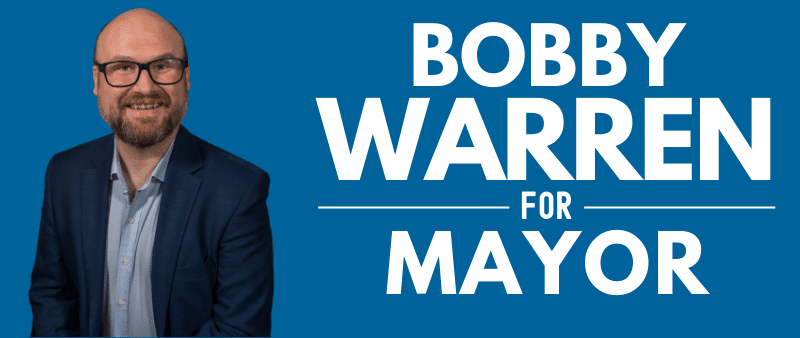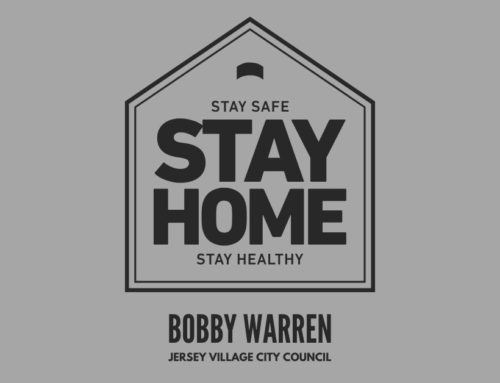Joe Pennington has been a police officer for 40 years, is currently the Harris County Republican Party Chair for Precinct 495 and is a long time resident of Jersey Village. I have invited him to share his thoughts on governance in Jersey Village in light of the ongoing municipal elections.
I recently received a mailer that was critical of the state of governance in the City of Jersey Village. I suspect the motivation for the diatribe was the progressive changes in the management team in the city brought by our current city manager. Many old alliances and dysfunctional relationships between some of our neighbors and city employees were disrupted. Certain residents including some council members sought status and influence by cultivating friendships with some city department heads. There was stagnation in the Jersey Village city government as a result of the failure of leadership and lack of strategic thinking and long range planning skills of the previous management team. If you are standing still you are backing up – you are not moving forward and technology and a regional and global environment of best practices is passing you by.
Prior to the arrival of Mike Castro the city was in a state of urban decline. The previous city manager was whistling past the city infrastructure graveyard. Jersey Village’s water and sanitary sewer system was deteriorating, our roadways and storm sewers were crumbling and below standards, crime had risen, criminal investigations were neglected with crimes unsolved and justice undelivered for victims, forensic evidence collection and the chain of custody were corrupted, the plan for parks and recreation was there was no plan, and attention to economic development was nonexistent. The tail was wagging the dog and the department heads had no supervision. That is not the case in Jersey Village today we have a tactical coach, a game-plan and we are moving down field with a talented team. The recent flood showcased the dedication to duty and performance by all our city departments and employees who most if not all do not live in Jersey Village. They came to our aid and their heightened visibility in their presence continues to be a comfort after the flood.
The performance and attention to detail by the current city administration has resulted in fiscal stability and responsibility and a culture of integrity and conservative stewardship of our tax dollars. There has been a skyrocket increase in the collective curb appeal of our city as reflected in the landscaping and appearance of municipal buildings and by the code enforcement and delivery of excellent customer services by city employees. This has not occurred by accident or coincidence. Mike Castro has a PhD in Public Administration from the University of Houston and is a West Point graduate. He has been accused of having the personality of George Patton but he too like General Patton will jump up on a fuel drum to direct traffic if the job needs to get done. He has assembled a very talented and highly competent management team that needs to be encouraged and unleashed to take our city into the future and does not, does not need to be micromanaged by political hacks. Your vote does make a difference and if we don’t get it right we could lose our whole team. Remember what happened to the Oilers when there was only one voter & he got it wrong.
One of our wise and visionary neighbors Meg Crady most eloquently spoke of our city and the exciting times and future for Jersey Village at the last city council meeting. Even though she had water in her home from the recent flood she has chosen not to be a victim but has chosen to be a leader and encouraged us all to be beneficiaries of living in the best city in the world. The recent flooding in Jersey Village was an Act of God and not the result of the actions or lack thereof on the part of our city Government. Good government is not an Act of God it is the result of the actions of We the People. Who you vote for or if you do not vote will directly result in the government that We the People get and deserve. With the credentials our management team has they could find a better team owner to work for tomorrow if we get it wrong. Sometimes hope and change are not a good thing but due diligence is a good thing and is not optional before casting a ballot. If we get the wrong outcome and the wrong candidates are selected don’t wonder why but ask the person in the mirror what happened.
What are the main characteristics of good governance?
Good governance is accountable
Accountability is a fundamental requirement of good governance. Local government has an obligation to report, explain and be answerable for the consequences of decisions it has made on behalf of the community it represents.
Good governance is transparent
People should be able to follow and understand the decision-making process. This means that they will be able to clearly see how and why a decision was made – what information, advice and consultation council considered, and which legislative requirements (when relevant) council followed.
Good governance follows the rule of law
This means that decisions are consistent with relevant legislation or common law and are within the powers of council.
Good governance is responsive
Local government should always try to serve the needs of the entire community while balancing competing interests in a timely, appropriate and responsive manner.
Good governance is equitable and inclusive
A community’s well-being results from all of its members feeling their interests have been considered by council in the decision-making process. This means that all groups, particularly the most vulnerable, should have opportunities to participate in the process.
Good governance is effective and efficient
Local government should implement decisions and follow processes that make the best use of the available people, resources and time to ensure the best possible results for their community.
Good governance is participatory
Anyone affected by or interested in a decision should have the opportunity to participate in the process for making that decision. This can happen in several ways – community members may be provided with information, asked for their opinion, given the opportunity to make recommendations or, in some cases, be part of the actual decision-making process.




